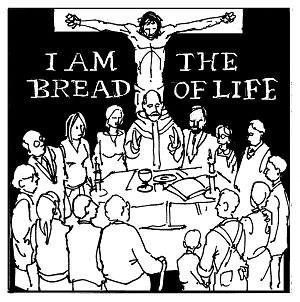
« Whoever eats my flesh and drinks my blood remains in me and I in them » (John 6:55).
Solemnity of the Body and Blood of Christ
Dt 8:2-3, 14b-16a; PS 147; 1 Cor 10:16-17; Jn 6:51-58
Companies like « Ancestry » can reveal your genetic identity and connection to all other human beings with a sample of your saliva. This helps us understand something of the mystery we celebrate at the Solemnity of the Body and Blood of Christ.
All human beings are one species, linked together by our genetic makeup. By our shared blood, human beings are a great river of common elements that produce our human bodies. We are one flesh, and each generation recycles the same chemistry that forms our carbon-based structures to make new human beings.
Christology, the branch of theology that explores the mystery of Jesus’ identity as both human and divine, informs our faith. We believe that Jesus entered the river of human life and shared fully in our human condition. His body and blood participated in the common source of the universal human family. But something happened to the human family because of him, a leap from the old creation of the first Adam to a new creation suffused with glory.
By his Incarnation and his redemptive death on the cross, Jesus healed our old nature, held captive by sin and its power to alienate us from God. Jesus embraced our sinful nature and took it with him into death on the cross. By his resurrection, Jesus revealed a newly transformed human nature, free of the disorientation of sin. The image and likeness of God, our true family resemblance, was renewed.
St. Paul writes that Jesus is the new Adam, the pioneer of the new creation, an older brother leading us to make this same leap by baptism into a new human destiny – eternal life with God. Baptism incorporates us into the risen body of Christ. When we receive the Eucharist, we celebrate and nourish our union with him and with the other members of the Body of Christ.
In Communion, we receive the body and blood of Jesus in a sacramental way, because the bread and wine we consume are visible signs of a hidden reality. Our Communion is an encounter with the living Christ, Jesus in glory. His divine fullness is poured into us through his Holy Spirit. In St. Augustine’s famous phrase, “We become what we consume,” we are transformed from our old nature to a new nature, perfected by grace.
Imagine at each Communion that you are receiving a transfusion of the glorified blood of Jesus, or that you are experiencing a kind of spiritual dialysis, a purification of your old self by this intimate union with him. This is what love does. Other images try to capture the power of this union.
Imagine a meal in which the food you share is merely a sign of the union you experience with a beloved friend, a lover, a spouse or guest who transforms you intimately. Ordinary flesh and blood cannot reveal this dimension of Communion, but the Spirit can. This is the leap of faith that changes everything, that reveals us as a new creation in Christ. It is our identity as members of the Body of Christ that sends us from Mass into the world. The implications of this union expand into every aspect of our relationship with God and our responsibility for one another.
This mystery is, in the words of the Vatican II document on the liturgy, “the source and summit” of our Christian faith. What an absolutely amazing journey we are on. Do we know how wonderful we are?